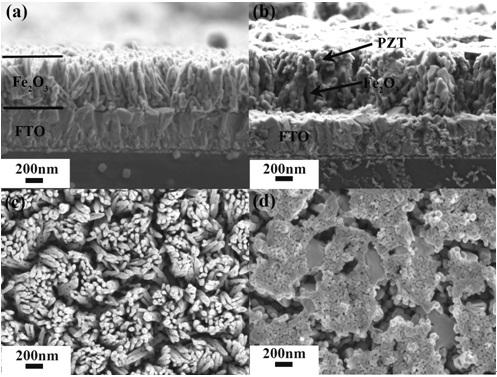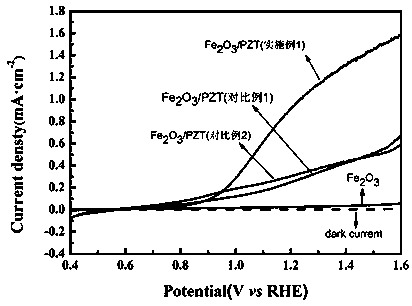Preparation method for hematite nanorod array photoanode modified by lead zirconate titanate
A nanorod array, lead zirconate titanate technology, applied in the field of catalysis, can solve problems such as compounding, and achieve the effects of simple process, excellent stability, photocatalytic hydrogen production performance, and improved efficiency
- Summary
- Abstract
- Description
- Claims
- Application Information
AI Technical Summary
Problems solved by technology
Method used
Image
Examples
Embodiment 1
[0033] A preparation method of a hematite nanorod array photoanode modified by lead zirconate titanate, comprising the following steps:
[0034] S1. Preparation containing 0.3M FeCl 3 ·6H 2 O (0.3mol / L) and 2M NaNO 3 (2mol / L) aqueous solution as the growth solution of hematite;
[0035] S2. Using conductive glass as the conductive substrate, place it obliquely in a polytetrafluoroethylene-lined stainless steel reactor with the conductive side facing down, and pour the precursor solution into the lining to fill 3 / 4 of the lining; Place the reaction kettle in an oven and heat it at 100°C for 8 hours, then cool it down to room temperature naturally, synthesize a FeOOH film on conductive glass by hydrothermal synthesis, wash it with deionized water, and dry it in air for later use;
[0036] S3. Prepare a lead zirconate titanate precursor solution. 0.22M Pb(CH 3 COO) 2 ·3H 2 O (10% excess), 0.04M Zr(OC 4 h 9 ) 4 and 0.16M Ti(OC 4 h 9 ) 4 Dissolve in methanol or ethyle...
Embodiment 2
[0040] A preparation method of a hematite nanorod array photoanode modified by lead zirconate titanate, the difference between the preparation method and Example 1 is that the growth solution of hematite in step S1 is 0.15M FeCl 3 ·6H 2 O and 1M NaNO 3 aqueous solution; the reaction temperature is 95 ° C, the reaction time is 4h.
Embodiment 3
[0042] A preparation method of a hematite nanorod array photoanode modified by lead zirconate titanate, the difference between the preparation method and Example 1 is that the growth solution of hematite in step S1 is 0.15M FeCl 3 ·6H 2 An aqueous solution of O and 0.2M urea; the reaction temperature is 100°C, and the reaction time is 12h.
PUM
| Property | Measurement | Unit |
|---|---|---|
| Thickness | aaaaa | aaaaa |
| Photocurrent density | aaaaa | aaaaa |
Abstract
Description
Claims
Application Information
 Login to View More
Login to View More - R&D
- Intellectual Property
- Life Sciences
- Materials
- Tech Scout
- Unparalleled Data Quality
- Higher Quality Content
- 60% Fewer Hallucinations
Browse by: Latest US Patents, China's latest patents, Technical Efficacy Thesaurus, Application Domain, Technology Topic, Popular Technical Reports.
© 2025 PatSnap. All rights reserved.Legal|Privacy policy|Modern Slavery Act Transparency Statement|Sitemap|About US| Contact US: help@patsnap.com



